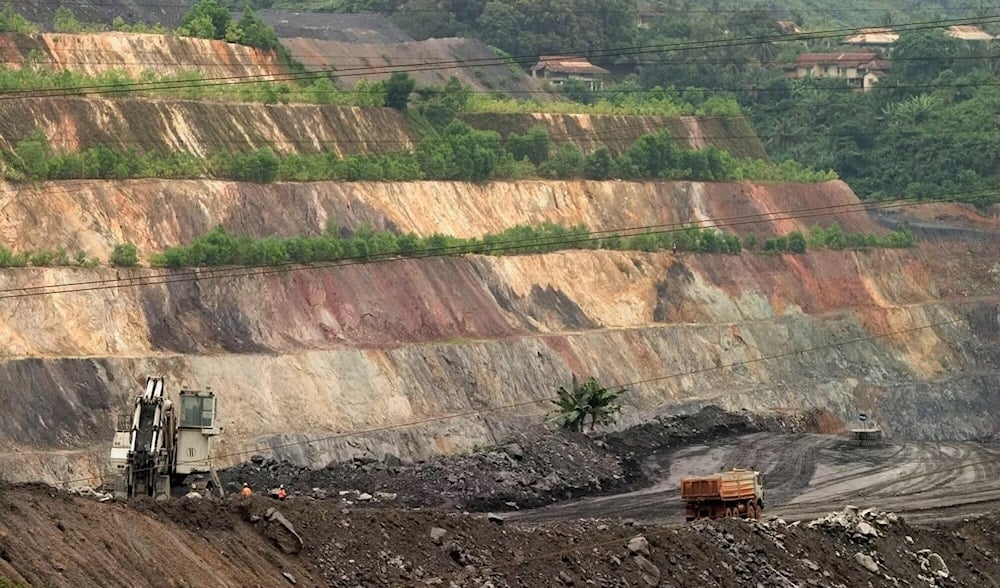First gold refinery opens in Ghana after centuries of mining
Ghanaian VP anticipates that the refinery will directly employ 80-120 people while creating 500 indirect jobs.
-

A view of the company Bogoso Gold Limited, open cast gold mine near the town of Prestea, Ghana, September 27, 2005. (AP)
Ghana inaugurated its first commercial gold refinery in Accra on Thursday in an effort to enhance value and increase profits from the precious metal, after centuries of mining, making it the lead gold producer in Africa.
The Royal Ghana Gold Refinery is a partnership between Rosy Royal Minerals of India and Ghana's central bank with a 20% stake, consisting of a capacity enabling 400 kg of gold to be processed daily.
The refinery will produce gold dore from small-scale, artisanal miners before obtaining licenses to source the metal from large-scale miners.
"With the ability to refine our gold, we will be able to sell it at the appropriate price, enabling us to retain its economic value within our borders while creating numerous jobs for the youth," Ghanian Vice President Mahamudu Bawumia said at the refinery's launch, marking "a new era" poised to contain gold smuggling and enhance the country's gold revenues.
While a significant amount of the output from unregulated artisanal miners, known locally as galamsey, is smuggled outside the country, Ghana exports its gold in raw form from licensed companies.
New doors open
The latest partnership and development in Ghana's gold industry has opened doors for potential benefits enabling the nation to maintain its lead in gold production in the continent, a spot it retained last year due to increased production from small-scale, artisanal miners generating an output of 4.03 million ounces.
The refinery is expected to directly employ 80-120 people while creating 500 indirect jobs, Bawumia said.
In 2021, the Bank of Ghana launched a gold purchase program aimed at boosting reserves through local purchases and stabilizing the cedi. The bank's gold purchases amounted to 65.4 tons, valued at $5 billion, Bank Governor Ernest Addison said, highlighting the bank's keenness on promptly obtaining certification for the refinery from the London Bullion Market Association (LBMA).
The refinery accreditation would ultimately help the bank "diversify and organically grow its foreign exchange reserves and accumulate more gold reserves to reduce dependence on external borrowing," Addison stated.
The general secretary of the Small-Scale Gold Miners Association, Godwin Armah, asserted that for the refinery to earn the trust and support of members, it must be "transparent" with its gold pricing and quantities.
SwissAid investigates Africa gold smuggling: UAE largest beneficiary
SwissAid, an advocacy and support organization headquartered in Switzerland, has revealed that "between 321 and 474 tons of artisanal gold in May are produced annually in Africa without being announced."
In its report titled "On the Trail of African Gold," the company highlighted that "at least 435 tons of gold were smuggled from the African continent in the year 2022 alone." These figures underscore a substantial loss of revenue for numerous African countries.
The report, released by the organization on the evening of May 30, further stated that "tracing the path of gold from its extraction to its final use is not easy. After being extracted, the precious metal will be sold, transported, processed, exported, reprocessed, and then resold. All of this is often through the hands of many people, in different countries. Much of the gold trade is opaque."
The report highlighted that "each year, between 321 and 474 tons of artisanal gold are produced in Africa without being declared. This equates to a value of between $24 billion and $35 billion as well as between 72 and 80% of Africa’s total artisanal gold production."
The research also underscores a concerning trend: gold smuggling in Africa has more than doubled between 2012 and 2022.
According to the research's authors, Mark Omel and Evan Schultz, "the significance of these numbers becomes even more pronounced when we consider that gold serves as the primary source of income for many African countries."

 4 Min Read
4 Min Read








